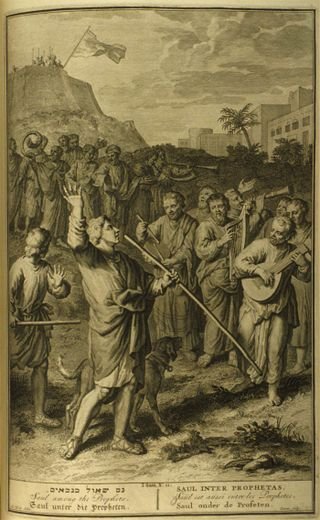“Is Sultan Al Jaber Also Among the Prophets?” (1 Samuel 10)
Climate Bible Study: March 2023
“Then Samuel took a flask of olive oil and poured it on Saul’s head and kissed him, saying, “Has not the Lord anointed you ruler over his inheritance?” (I Samuel 10:1).
When the United Arab Emirates, host government of this year’s COP28 climate summit, appointed their minister for industry and advanced technology, Sultan Ahmed Al Jaber, as the president for COP28, it was an anointing of sorts. The president of a COP has a great deal of influence. They usually spend the better part of two years jet-setting the globe, making the backroom deals as a lead-in and a lead-out for what they hope will be a successful COP. They set the agenda for the COP and govern the proceedings. It’s hard not to make some parallels to the prophet Samuel’s pronouncement over Israel’s first king, Saul. Our warming planet is as much God’s “inheritance” as the fledging nation of Israel. Al Jaber will “rule” in significant ways over COP28. And the question is key for those who will be praying for the Sultan this year: is it God himself, and not just the UAE, who has ultimately appointed him in this role?
The problem, if you haven’t heard, is that Al Jaber is an oil industry exec, and in fact will retain his role as CEO of Abu Dhabi National Oil Company (ADNOC), one of the world’s largest petroleum producers. ADNOC was one the many fossil fuel companies that saw record profits last quarter and its current plans for new drilling reportedly amount to the second largest expansion of oil and gas production planned globally. Even as recently as last week, civil society groups reiterated calls for Al Jaber to resign. Amnesty International said, “Sultan al-Jaber cannot be an honest broker for climate talks when the company he leads is planning to cause more climate damage. It is obvious, despite Sultan al-Jaber’s denials, that his dual role is a glaring conflict of interest which will contribute to further climate disaster and unfolding human rights violations.” Political and business interests—including those who are sympathetic to climate action—have taken a more hopeful and pragmatic stance. For instance, the Bloomberg editorial board wrote:
To their credit, most global leaders have supported Al Jaber’s appointment and the UN’s decision to host this year’s COP in the UAE, including President Joe Biden’s special climate envoy, John Kerry. But skepticism is inevitable, which puts an extra burden on Al Jaber to deliver…. There is a difference, of course, between giving a good speech and rallying the world to act. And so it was encouraging to hear Al Jaber stress in his speech that this year’s summit must be “a COP of action,” one that moves the world “from talking about goals to getting the job done.” Environmental activists will rightly hold Al Jaber accountable for translating words into actions, but they should also recognize that far more can be accomplished by accepting him as an ally than dismissing him as a foe
The nice thing about intercessory prayer is the freedom God grants us. We can pray alongside Amnesty for Al Jaber’s resignation or alongside Bloomberg for Al Jaber’s effective alliance. And we can take heart from those stories in Scripture where the Spirit of the Lord himself followed up on an anointing. After giving some instructions to Saul, Samuel explains to Saul what will happen next:
After that you will go to Gibeah of God, where there is a Philistine outpost. As you approach the town, you will meet a procession of prophets coming down from the high place with lyres, timbrels, pipes and harps being played before them, and they will be prophesying. The Spirit of the Lord will come powerfully upon you, and you will prophesy with them; and you will be changed into a different person. Once these signs are fulfilled, do whatever your hand finds to do, for God is with you (I Sam 10:5-7.)
When the astounding transformation occurs, the amazed bystanders uttered a phrase which apparently became a saying from then on out in Israel: “Is Saul also among the prophets?” (I Sam 1:12). Modern scholars have been trying to track down how this saying was used, and one writes,
In common use this saying may have been applied to situations involving participation in a particular group or activity by an individual who for one reason or another would not be expected to participate. It may have thus implied that such a group had absorbed everyone, even the least likely person. Such a saying might easily have arisen from popular familiarity with Saul’s reputation as an antagonist of the prophets. When someone would find an unlikely individual involved in some group, therefore, he would say, “Is Saul, too, among the prophets?”
“In common use,” we might imagine a world where the Paris Agreement “had absorbed everyone, even the least likely person,” i.e., Sultan Al Jaber. In “uncommon use” how much more thrilling to imagine that the Spirit of the Lord might come upon such a crucial figure as the newly-appointed president of COP28? As a side note, I find it interesting that the Spirit of the Lord came upon Saul only after he encountered the procession of prophets with their lyres, timbrels, pipes, and harps. The witness that we—2023’s “procession of prophets”—bear might be the very music that tips Al Jaber into prophesying himself.
You are very dear to God,
Lowell Bliss
on behalf of the Climate Intercessors Leadership Team

